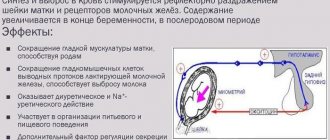When pregnancy comes to its logical conclusion, most mothers literally stop sleeping at night. The cause of insomnia is the many issues that concern a woman in labor. The expectant mother thinks about whether it will be difficult for her to endure contractions, whether the birth will be completed successfully and whether the baby will be healthy.
But the main question for many is the date of birth. Often mothers begin to listen to the slightest changes in their condition and take each symptom as the beginning of a process. How to deal with such a delicate problem as diarrhea before childbirth? Is this a harbinger or a pathology?
When a sensitive issue is a positive sign
The human body is capable of adapting to various conditions, and all physiological processes in it occur for a reason. In particular, diarrhea before childbirth occurs for a completely understandable reason.
It turns out that the woman’s body is preparing for the passage of the child’s body through the pelvis. If the baby’s head has already dropped, then there is enormous pressure on the organs and the body begins to throw out excess in order to facilitate the process of the upcoming birth.
Causes of bloating during pregnancy
Bloating during pregnancy in the 1st trimester most often occurs due to hormonal imbalances in a woman’s body. The main function of the hormone progesterone is to protect the embryo. It affects the muscle tissue of the uterus, reducing the frequency of its contractions to prevent miscarriage. But the activity of the hormone affects the muscles not only of the genitals, but also of many other organs, including the digestive tract. An increase in the concentration of progesterone in the blood causes relaxation of the muscles of the walls of the stomach and intestines. As a result, the intestinal tract loses the ability to perform normal peristalsis and gradually fills with gases.
Bloating during pregnancy in the 2nd trimester occurs due to the pressure of the enlarging uterus on the intestines. Food cannot pass freely through the compressed intestines, which inevitably leads to constipation, fermentation processes and the formation of gas bubbles. Flatulence in pregnant women is often provoked by the use of medications containing iron. Bloating in late pregnancy is not dangerous as it is just a symptom of bowel irritation. But you should definitely consult a doctor if flatulence during pregnancy is accompanied by pain.
The following factors also cause bloating during pregnancy:
- poor nutrition;
- insufficient water intake;
- wearing tight and uncomfortable clothes;
- sedentary lifestyle;
- smoking and addiction to alcoholic beverages;
- chronic diseases of the digestive system.
Symptoms of bloating during pregnancy:
- Heaviness in the abdomen, frequent and strong emission of gases.
- Constant urge to vomit, not associated with toxicosis.
- Decreased appetite.
- Rumbling and seething in the stomach, bad breath.
- Indigestion, diarrhea, constipation.
True Symptoms
Diarrhea, which precedes the birth of a child, occurs up to 5-6 times a day. At the same time, a woman rarely feels weak, because such diarrhea should not be accompanied by dehydration.
Feces do not emit a strong odor, they are not too abundant and without foam. Diarrhea is often accompanied by gas and uterine cramps. False contractions often occur, sometimes turning into real labor. After all, the expectant mother’s intestines have been cleansed, which means nothing will interfere with the birth process.
When is the due date?
One sign that diarrhea is a sure sign is that it doesn't last long. If a delicate problem happened for no apparent reason and went away without help, it is most likely harmless diarrhea before childbirth. How many days can this happen? Experts say that for a healthy woman, such a harbinger indicates that in a day or two the baby will be born.
Sometimes it is not easy to determine how many days before childbirth diarrhea begins. Such a sign is, rather, an indirect harbinger, and various factors can influence it. The age of the woman in labor, her state of health, and individual physiological characteristics are affected. If the birth is the second or subsequent, then there may be no diarrhea at all.
Dietary recommendations
Regardless of how many weeks or days before birth diarrhea begins, a pregnant woman should pay attention to her diet if she feels unwell. It is advisable to adhere to the following recommendations:
- Eliminate from the diet foods that are too fatty and spicy, which can cause heartburn and irritation of the gastrointestinal mucosa.
- Refuse legumes and foods rich in fiber - this can cause increased diarrhea and increased gas formation;
- Drink often, but little by little: tea, jelly, compotes.
- Monitor your weight; if you experience significant weight loss with diarrhea, seek the help of a doctor.
- Prepare steamed dishes, introduce water-based porridge and fermented milk products into your diet.
- Eat at least 6 times a day, divide food into fractional portions.
It is undesirable to consume foods in large quantities that significantly harden the stool (baked apples and carrots, rice) or use hardening medications. This can lead to constipation, which negatively affects a woman’s health, causing intoxication of the body. A pregnant woman awaiting childbirth needs to carefully monitor her condition, adjusting her diet taking into account the consistency and color of her stool.
If there is no precursor
A clean intestine helps ensure high-quality labor. In addition, the presence of feces can confuse a woman in labor and distract her from such an important process, not to mention possible discomfort. Therefore, in the hospital before childbirth, they often help to empty the intestines. To do this, the woman is given special harmless suppositories or an enema.
There are also situations when diarrhea did not occur, but the woman in labor was urgently admitted to the maternity hospital. What if doctors do not have time to carry out the necessary procedures? This is not a cause for concern, since by the time of pushing or during them, bowel movements will still occur. A woman in labor should not be embarrassed by trying to interfere with the natural process. Doctors have seen something different, and it’s hard to surprise them with such a sight.
Why is it really important to listen to your body?
It is not for nothing that the expectant mother worries about whether diarrhea before childbirth always means that the birth of the child is approaching. The fact is that loose stools are not always a positive sign. It is possible that diarrhea was the result of poisoning or another serious and dangerous disease.
Can diarrhea before childbirth be green? Doctors warn that this color of stool, especially in combination with vomiting, can be an alarm bell. Then the expectant mother will need hospitalization.
If the diarrhea before childbirth is yellow, foamy and has a strong odor, self-medication is also not recommended. It is best to call an ambulance and trust the specialists, otherwise the consequences can be very unpredictable. For example, dehydration, which will result from repeated loose stools, will entail irreversible processes in the body of both mother and baby.
Useful video
https://youtu.be/6rb8tR_bwxE
The period of pregnancy causes many changes in the body. One of them is a change in intestinal motility. Women who never complained of indigestion before pregnancy begin to suffer from constipation or diarrhea.
Expectant mothers react differently to these two violations. Many people consider constipation to be an integral inconvenience that accompanies pregnancy and treat it calmly. Unlike constipation, diarrhea causes much more discomfort, forcing you to pay attention to it. In addition, it is considered a symptom of intestinal infections, and this causes anxiety in pregnant women. Does diarrhea in primiparous and multiparous women always indicate illness and are there safe ways to eliminate it?
What to do if you have diarrhea before childbirth?
The duty of the expectant mother is to listen to her body and respond in a timely manner to any changes that seem pathological.
Even if the mother knows that diarrhea occurs before childbirth, and most often this turns out to be the norm, you should not ignore your condition. And positive symptoms can be very unpleasant, and to avoid possible consequences, mom should:
- Move less and stay in a horizontal position more, rest and relax.
- Do not indulge in heavy foods, prefer easily digestible snacks. Consolidating food will have a positive effect.
- Drink more plain water to avoid dehydration.
- Try not to leave the house, avoid crowded places.
After childbirth
A woman does not always face a delicate problem before the birth of a child. And if diarrhea before childbirth is rather the norm, then there should definitely be no diarrhea after it.
However, this is a fairly common situation, sometimes caused by an enema before childbirth or unusual hospital food. Such diarrhea will most likely lead to dehydration, so the mother needs extreme care for the body, since it is in a weakened state.
A set of measures in such a situation boils down to the following:
- Preventing dehydration of the body, restoring water-salt balance.
- Taking medications to restore intestinal microflora.
You can provide first aid to a young mother yourself; you just need to listen to the first advice. You can replenish fluid levels in the body by drinking plenty of fluids. You can drink both plain water and fruit drinks with compotes. Things will go faster if the drinks are close to body temperature. According to doctors, this way the liquid is absorbed faster by the body.
The ideal option is to purchase sachets labeled “Regidron” at the nearest pharmacy. The drug "Hidrovit" or any other will do. By the way, with the advent of the baby, such products should become permanent “inhabitants” of the home medicine cabinet.
Norms and deadlines
The prenatal state of a woman before giving birth changes 10-14 days before the event. 70% note a change in psychological state (excitement, anxiety) and appearance (posture, abdominal position). Other patients feel the warning signs only before contractions, when the cervix begins to dilate.
After what time labor begins depends on the woman’s behavior at the first warning signs. Stimulation, in the form of active walking, massage, stimulation of the nipples, will bring the onset of contractions closer. But the norm for each case is individual.
The optimal period for resolving pregnancy is from 37 to 42 weeks. Babies born before this time are considered premature, later - overmature. 75% of births occur between 39 and 41 weeks. It has been noticed that boys are formed and born earlier than girls.
Some babies, while developing slowly in the second trimester, gain up to 1.5 kg of additional weight in the last month before birth. Mom feels that her stomach has grown a lot and it has become more difficult.
The norm for obstetric gestation is 40 weeks. When calculating the maximum permissible value, the gynecologist is guided by this figure. But only 5% of babies are born according to the doctor’s preliminary calculations. The average error is 10-14 days.
Influencing factors:
- menstrual cycle;
- heredity;
- during pregnancy.
A frequently used method for determining PDR when registering is focusing on the menstrual cycle. On the Internet, it’s easy and quick to calculate the deadlines yourself using special calculators.
How to find out how many days will it take for labor to begin? If the date of conception (N) is known, the formula is used: N+266 days = day of delivery. If ovulation (O) was tracked, the number is calculated: O +268 days. Or 280 days are added to the first day of menstruation.
In 7 out of 10 patients, the week of childbirth coincides with the period of pregnancy resolution for the mother or grandmother. Similarities are also noted in the height and weight of infants.
The course of pregnancy affects the maturity, behavior of the fetus and the course of events in the future. Polyhydramnios, abnormal placenta previa, a large fetus and chronic diseases can bring the date of delivery closer. For patients with a difficult pregnancy, excessive nervousness before childbirth is a factor that provokes the threat of miscarriage.
Taking medications
Is it possible to independently use drugs to normalize the microflora of the intestines and stomach? If a mother does not want to inadvertently harm herself and the baby she is feeding, she should trust the advice of a specialist. The doctor will select the right medicine, taking into account the fact that the mother is in the lactation period.
If diarrhea after childbirth was provoked by the gentle diet of the mother, who is afraid of spoiling the milk, then it is better to simply adjust your diet. The pediatrician, who will definitely visit a new patient, will be happy to give recommendations on healthy and harmless nutrition for a nursing woman.











